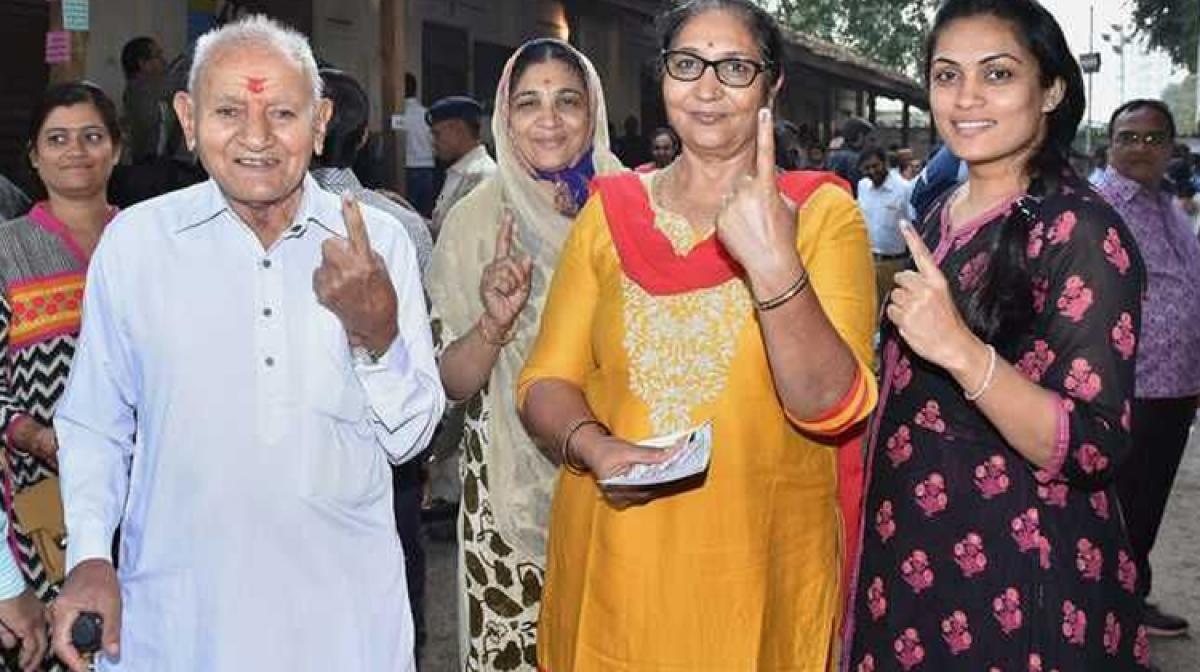Live
- GMR Airports Unveils AI-Powered Digital Twin Platform to Transform Airport Operations
- India poised to become leading maritime player: PM Modi
- Top Causes of Kidney Stones and How to Recognize Silent Symptoms
- India’s renewable energy capacity logs 14.2 pc growth at 213.7 GW
- Winter Session of Odisha Assembly adjourned sine die
- Biden calls Trump's tariff approach 'major mistake'
- After Drama Over Eknath Shinde’s Chief Minister Race, Maharashtra Cabinet Formation Faces New Tensions
- Egyptian FM, Blinken discuss recent developments in Syria
- Iran's supreme leader says Syria's developments result of US-Israeli 'plot'
- Elon Musk to Purchase $100 Million Luxury Mansion Next to Donald Trump's Mar-a-Lago, Report Reveals
Just In

Sixty-eight per cent voter turnout was recorded on Saturday in 89 seats in the first phase of Assembly polls in Gujarat, where Prime Minister Narendra Modi and Congress’ heir-apparent Rahul Gandhi are locked in a bitter, high-stakes political duel after a 22-year reign of the BJP.
Ahmedabad/Gandhinagar: Sixty-eight per cent voter turnout was recorded on Saturday in 89 seats in the first phase of Assembly polls in Gujarat, where Prime Minister Narendra Modi and Congress’ heir-apparent Rahul Gandhi are locked in a bitter, high-stakes political duel after a 22-year reign of the BJP.
Sixty-eight per cent voting was registered at the close of polling at 5 pm in the first phase, though there were still long queues lined up to vote at most polling stations, Gujarat Chief Electoral Officer (CEO) B B Swain said. There were reports of technical glitches in electronic voting machines (EVMs) in Surat and some other centres, but the polling process resumed after the machines were replaced, Election Commission officials said.
Surprisingly, Rajkot which is known for its ‘siesta time’ from 1 to 4 in the afternoon, registered around 40-45 per cent voting, with people seen queuing up in the afternoon to vote. Rajkot’s Visavadar saw their voter, former Chief Minister Keshubhai Patel, exercise his rights coming all the way from his residence in Gandhinagar.
Villagers of Limdi village in Surendranagar district have boycotted the elections over their various grievances. In Surat, in many of the Patidar dominated areas, posters emerged with photographs of the dead Patidar youth, killed during and after the Patidar agitation on the GMDC grounds on August 25, 2015, reading “Don’t forget the sacrifice of these martyrs and uproot the BJP”.
Malfunctioning of EVM machines was reported in Sattapar village in the Anjar constituency and the polling process had to be halted. The Chief Election Officer said an inquiry was ordered after senior Congress leader Arjun Modhwadia complained of possible EVM tampering at three polling booths in a Muslim-dominated area in Porbandar. Modhwadia claimed that some machines were found to be connecting to external devices via bluetooth.
Swain said: “We received the complaint with screenshots about the linkage of EVM with WiFi or Bluetooth devices. So we rushed the Collector, Porbandar, and our observers from the Election Commission of India (ECI) to the place. Their scrutiny says that there was no merit in the complaint by Arjun Modhwadia.”
As many as 977 candidates were in the fray in the 89 seats of Saurashtra and south Gujarat, of which 63 were won by the BJP and 26 by the Congress in the 2012 Assembly polls. A total turnout of 71.32 per cent was recorded in the last election to the 182-member Assembly.
“We have received complaints of faulty EVMs from some places and all such machines have been replaced with the spare ones kept at the polling stations,” he said. With the marriage season on, brides and grooms, clad in wedding finery, came to polling booths along with their relatives to exercise their franchise. Many such voters were seen in Bharuch, Bhavnagar, Gondal and Surat.
A 115-year-old woman from Upleta town of Rajkot, Aajiben Chandravadia, also voted.
Several important leaders and candidates, including Gujarat Chief Minister Vijay Rupani, his opponent on Rajkot-West seat Indranil Rajyaguru, senior Congress leader Ahmed Patel, Gujarat BJP chief Jitu Vaghani were among the early voters. Cricketer Cheteshwar Pujara also cast his vote in Rajkot.
Prominent candidates in Saturday’s battle include Chief Minister Vijay Rupani, who is contesting from Rajkot (West), Congress’ Shaktisinh Gohil (Mandvi) and Paresh Dhanani (Amreli). The election is crucial for the Congress and the BJP before the 2019 Lok Sabha polls and is seen as a prestige battle for Modi, who was the chief minister of Gujarat from 2001 to 2014, and a litmus test for the leadership of soon-to-be Congress chief Rahul Gandhi.
Emotive issues of religion and caste competed with that of development and the attacks by the two parties often turned personal as leaders indulged in name-calling.

© 2024 Hyderabad Media House Limited/The Hans India. All rights reserved. Powered by hocalwire.com







